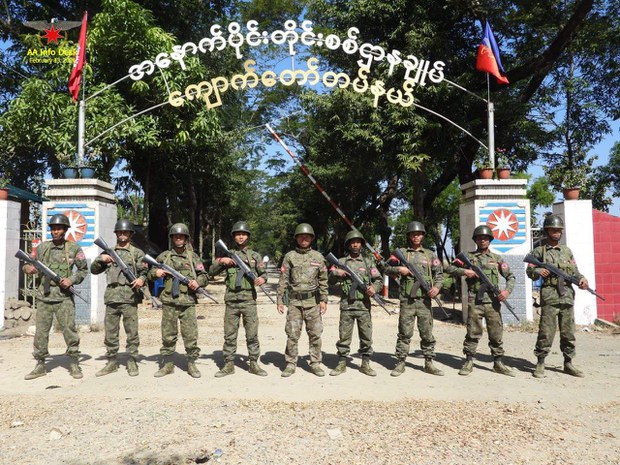


After months of fighting, the Arakan Army (AA) has taken control of Maungdaw in Myanmar’s Rakhine state, marking a significant shift in the ongoing civil war. The AA’s conquest gives them control of all three municipalities bordering Bangladesh and sparks fears of revenge against the Rohingya, who were forced to fight alongside the Myanmar military. The AA’s offensive began in 2022, after a ceasefire with the junta broke down, and they are now continuing to fight for control of other townships in the south of the state.
Arakan Army Seizes Control of Maungdaw in Myanmar's Rakhine State
Background:
The Arakan Army (AA), an ethnic armed group representing the Rakhine people, has been engaged in an armed conflict with the military junta in Myanmar since 2015. The conflict has displaced hundreds of thousands of people and has been marked by human rights violations on both sides.
In 2022, after a ceasefire with the junta broke down, the AA resumed its offensive in Rakhine state. Their goal is to establish an autonomous region for the Rakhine people within Myanmar.
Recent Developments:
On August 25, 2023, the AA seized control of Maungdaw, a strategically important town bordering Bangladesh. This marks a significant shift in the conflict, as the AA now controls all three municipalities on the Bangladesh border.
The AA's victory has raised concerns about possible retaliation against the Rohingya people, who were forced to fight alongside the Myanmar military against the AA. The Rohingya have suffered severe persecution and human rights abuses by the Myanmar military, including mass killings and forced displacement.
Top 5 FAQs:
1. Who is the Arakan Army? The Arakan Army is an ethnic armed group representing the Rakhine people, an ethnic minority group in Myanmar. They are fighting for autonomy and self-determination for the Rakhine people.
2. What is the conflict in Rakhine state about? The conflict in Rakhine state is rooted in ethnic tensions between the Rakhine people and the Rohingya, a Muslim minority group. The Myanmar military's crackdown on the Rohingya in 2017 forced over 700,000 people to flee to Bangladesh.
3. What are the implications of the AA's control of Maungdaw? The AA's control of Maungdaw gives them strategic leverage in the conflict and raises concerns about the safety of the Rohingya population in the area.
4. What is the international response to the conflict? The international community has condemned the Myanmar military's human rights abuses and has called for an end to the conflict. The United Nations has imposed sanctions on the military junta.
5. What is the future of the conflict? The future of the conflict is uncertain. The AA has indicated that it is willing to negotiate a political solution but has rejected the junta's conditions. The junta has expressed its resolve to defeat the AA militarily.

President Donald Trump is meeting with leaders of five Central Asian countries to discuss their vast reserves of rare earth metals, while also addressing a key point of friction in ongoing trade negotiations with China. The meeting comes on the heels of Trump's talks with Chinese leader Xi Jinping, where China agreed to delay their new export restrictions on rare earth elements. The U.S. is now seeking new ways to secure critical minerals, and the region is hoping for investment to develop their resources further.

US President Donald Trump has expressed concern over the tone of incoming New York City Mayor-elect Zohran Mamdani's victory speech, calling it "angry" and advising him to adopt a more cooperative approach. In response, Mamdani has urged Trump to "turn the volume up" and vowed to hold "bad landlords" accountable, citing Trump as an example. Trump has hinted at offering limited federal help to New York under Mamdani's leadership, but has also expressed doubt towards the mayor-elect's left-leaning policies. This clash between the two leaders marks a tense beginning to their relationship.

Chief Election Commissioner Gyanesh Kumar flagged off 14 participants from 7 countries as part of the International Election Visitors’ Programme 2025 to witness voting in the Phase-I of the Bihar Assembly Elections. The participants attended an inaugural session and were provided with a demonstration of the EVMs and a presentation on various aspects of elections in India. The participants will then embark on a two-day tour of Bihar to visit EVM dispatch centers and witness the actual polling on November 6. Since 2014, the IEVP has been showcasing the strengths of India's electoral system and sharing best practices with international election management bodies. The first phase of the Bihar Assembly elections, featuring 121 constituencies and over 3 crore voters, will be held on November 6.

The recent police raid in Brazil, which resulted in one of the deadliest operations in Rio's history, has sparked outrage and protests. Families of the victims claimed that their loved ones were executed by the police, while the government celebrates it as a win against crime. Shocking images of bodies lined up in the street have led to widespread protests and accusations of police brutality. However, official reports and videos of victims' bodies suggest that the deaths were not a result of armed conflict, raising questions about the excessive use of force by the police.

Four people have died and 11 have been injured after a UPS cargo plane crashed near Louisville Muhammad Ali International Airport in Kentucky. All flights in and out of the airport have been suspended as police and emergency services are attending the scene. Kentucky governor Andy Beshear has described the accident as "catastrophic" and is urging residents to obey any shelter-in-place orders.

Eight people have been killed and numerous others injured after a passenger train collided with a goods train in Chhattisgarh. The accident occurred in the afternoon, halting train services on the route and prompting the cancellation or diversion of multiple trains. Emergency teams have been dispatched to the scene, with rescue operations ongoing and medical treatment being provided to the injured passengers. Helpline numbers have been issued for convenience, and the railway authorities have assured that all efforts are being made to assist those affected by the tragedy.

Today, 5 November 2025, marks the 556th birth anniversary of Guru Nanak Dev Ji, the founder of Sikhism. As we celebrate this sacred and highly revered festival, let us remember and spread the teachings of Guru Nanak Dev Ji, which promote compassion, humility, and love for all. To commemorate this occasion, indianexpress.com has compiled heartfelt wishes and messages to share with friends and family, wishing everyone endless happiness, peace, and prosperity.

During the Emerging Science Technology and Innovation Conclave, PM Modi announced the launch of the Rs 1 lakh crore Research, Development and Innovation Fund. This fund, under the Department of Science and Technology, aims to encourage private sector investments in R&D to drive India's vision of becoming an innovation-driven nation. With this fund, India's R&D expenditure has doubled in the last decade and the country now has the world's third-largest startup ecosystem. PM Modi also highlighted how India's domestic capability has accelerated during the COVID-19 pandemic due to its successful digital public infrastructure.

A stampede at the Kasibugga Venkateswara Swamy Temple in Andhra Pradesh has left 10 dead and two injured. The temple had recently reopened and was experiencing high footfall due to a festival. Home Minister Vangalapudi Anitha has ordered a thorough investigation into the causes of the tragedy and has promised strict measures to prevent similar incidents in the future.

India and the United States have strengthened their already strong ties by signing a 10-year framework for their major defense partnership. The agreement, signed during a bilateral meeting between the two countries' defense ministers, emphasizes the importance of this partnership in maintaining a free and open Indo-Pacific region. This marks a significant step in solidifying the bond between India and the US in the defense sector.